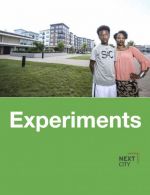Experiments

Experiments is published by Next City – a nonprofit organization that aims to inspire social, economic and environmental change in cities through journalism & events around the world. Based on current experience and experimentation, this eBook compiles articles on six trials from American cities. These trials range from incorporating artists into city planning to assessing the potential of community benefits agreements (CBAs) in city development. Together they inspire and provide lessons for city planners and leaders seeking to make cities more sustainable. Experiments also provides a platform for learning, as it calls for communities to write and share their own proven ideas with Next City.
This 29-page eBook commences with a short introduction by its editor, Ariella Cohen. In the first article Gregg Scruggs details the crossroads Columbia, in Maryland, faced regarding its future when a 30-year housing deal threatened to undermine its racial and ethnic diversity. Scruggs closes by introducing the Columbia Regional Housing Center, “which may be Columbia’s best chance to strike new ground” while keeping the city “integrated, diverse and inclusive” (page 14).
“How to bring more artists into city planning” by Jen Kinney uses the case of Mary Miss, the first artist-in-residence at New York’s City’s Department of Design and Construction (DCC), to illustrate an answer. Miss runs the City as Living Laboratory (CALL) and exemplifies through its projects how artists, as creative thinkers, can tackle city problems (pages 15 and 17).
Next, Erick Trickey describes the city-negotiated (CBA) in Detroit. Whilst the Rise Together Detroit coalition believes that stricter rules should have been set for developers, most agree this new law is a step forward, and therefore urbanists around America keenly wait to see how the ordinance will work in practice (pages 21–22).
“How Seattle’s well-intentioned planning experiment went wrong”, by Erica Barnett, discusses how the city of Seattle created focus groups to provide recommendations to improve Seattle’s Housing Affordability and Liveability Agenda (HALA) proposal. It purposely recruited focus group members from marginalized and underrepresented communities; however, attendance of these members quickly dropped, leaving groups “being dominated by longtime neighborhood activists” (page 24).
To close, Barnett highlights lessons that could be applied to help mitigate this in future. The short article that follows is based on the premise that all American cities share the same major struggles, but will customize their solutions. Josh Cohen outlines The Knight Cities Challenge, which is a US$ 5 million grant programme that has funded projects in 26 cities in three years. He identifies community leadership and buy-in as a common theme and key to success across the projects. He also points to Detroit’s Place Lab as a source of lessons on ethical redevelopment (page 27).
To end, Josh Cohen outlines an experimental commercial investment model in Portland led by Mercy Corps Northwest. Plaza 122, which has only recently opened to investors, tests Mercy Corps’ Community Investment Trust (CIT) programme. Not only does CIT allow low-income residents to buy shares of income-producing real estate, but also in the case of Plaza 122 it offers a landing place for low-income renters who are pushed out of more central areas (page 29).
Available from:
https://nextcity.org/ebooks/view/experiments
Book note prepared by Hannah Keren Lee
Search the Book notes database
Our Book notes database contains details and summaries of all the publications included in Book notes since 1993 - with details on how to obtain/download.
Use the search form above, or visit the Book notes landing page for more options and latest content.
For a searchable database for papers in Environment and Urbanization, go to http://eau.sagepub.com/

